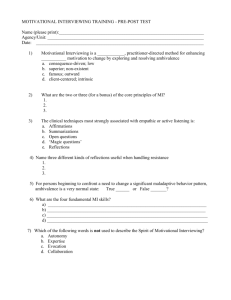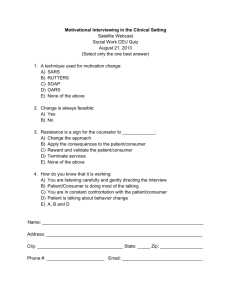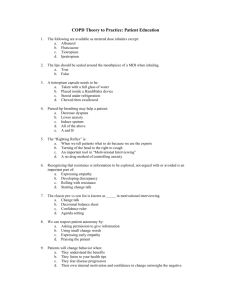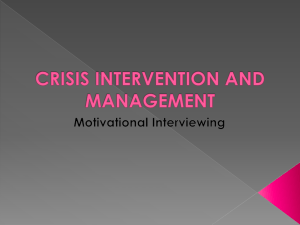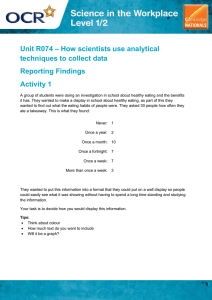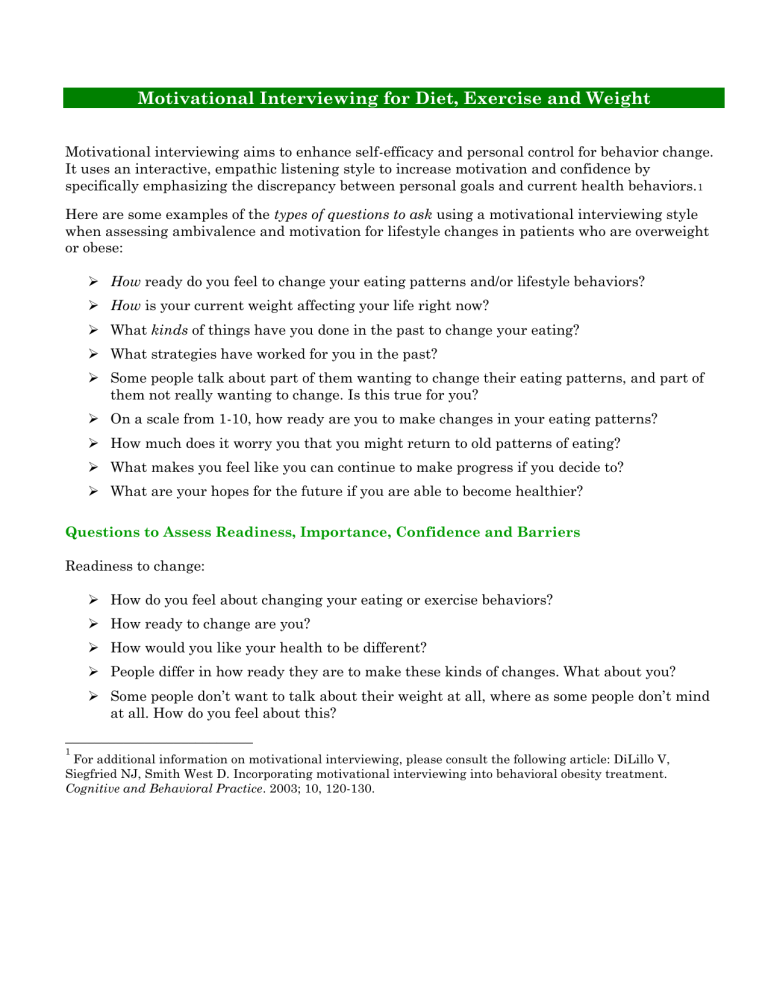
Motivational Interviewing for Diet, Exercise and Weight Motivational interviewing aims to enhance self-efficacy and personal control for behavior change. It uses an interactive, empathic listening style to increase motivation and confidence by specifically emphasizing the discrepancy between personal goals and current health behaviors. 1 Here are some examples of the types of questions to ask using a motivational interviewing style when assessing ambivalence and motivation for lifestyle changes in patients who are overweight or obese: How ready do you feel to change your eating patterns and/or lifestyle behaviors? How is your current weight affecting your life right now? What kinds of things have you done in the past to change your eating? What strategies have worked for you in the past? Some people talk about part of them wanting to change their eating patterns, and part of them not really wanting to change. Is this true for you? On a scale from 1-10, how ready are you to make changes in your eating patterns? How much does it worry you that you might return to old patterns of eating? What makes you feel like you can continue to make progress if you decide to? What are your hopes for the future if you are able to become healthier? Questions to Assess Readiness, Importance, Confidence and Barriers Readiness to change: How do you feel about changing your eating or exercise behaviors? How ready to change are you? How would you like your health to be different? People differ in how ready they are to make these kinds of changes. What about you? Some people don’t want to talk about their weight at all, where as some people don’t mind at all. How do you feel about this? __________________________ 1 For additional information on motivational interviewing, please consult the following article: DiLillo V, Siegfried NJ, Smith West D. Incorporating motivational interviewing into behavioral obesity treatment. Cognitive and Behavioral Practice. 2003; 10, 120-130. Importance of change: Tell me how things would be different for you if you _______ (were at a healthier weight, etc.) What do you think would happen if your weight doesn’t change? What are the most important things to you? What impact does your weight have on that? What would have to happen before you seriously considered changing? What are the good things about ________ (losing weight, eating healthier, exercising more)? What concerns do you have about _________ (losing weight, eating healthier, exercising more)? If you were to change, what would it be like? Building confidence: What would make you more confident about making these changes? How can I help you succeed? Are there things that you have found helpful in previous attempts to change? If you decided to change, what might your options be? What are some practical things that you need to do to achieve this goal? Barriers: What things stand in the way of your taking a first step? What barriers might impede success? (e.g., child care, transportation, distance, cost, accessibility) Motivational Interviewing Exercises to do with Patients 1) Readiness assessment _________________________________________________________________________ 0 5 10 If “0” is not ready to make changes (in your eating habits/physical activity) and “10” is ready to make changes, what score would you give yourself? You gave yourself a score of X. Why do you think you are X, and not ___ (a lower number)? OR You gave yourself a score of X. What would have to happen to move up to ___ (higher #)? 2) Decisional balance Discuss with the patient what he/she perceives to be the short-term and long-term benefits and drawbacks of making healthy changes. Encourage the patient to generate personal costs and benefits, and then openly discuss these to identify barriers and goals. Short Term Costs 1) 2) 3) 4) 5) Short Term Benefits 1) 2) 3) 4) 5) Long Term Costs 1) 2) 3) 4) 5) Long Term Benefits 1) 2) 3) 4) 5) The Rudd Center for Food Policy and Obesity www.YaleRuddCenter.org Key FRAMES to Motivation for Change F: Feedback Present feedback to the patient in a way that is respectful and has impact. This can include providing feedback about how unhealthy behaviors are harming the individual, but ensuring that your communication reflects the patient’s statements of concern. Feedback should be based from information gathered in patient interviews, reports, and objective measures. It can be helpful to present this data to the patient and elicit his or her opinions from this information. R: Responsibility Emphasize that the patient has the responsibility and freedom to make the choice to change. This is not a decision that can be made by anyone else, and it is really up to the patient to decide what decisions to make. A: Advice Provide clear and direct advice about the importance of making lifestyle changes and suggest different ways that this can be accomplished. Advice should reinforce that the patient makes the ultimate choice. M: Menu Offer different alternatives that the patient can choose from. For example, “There are different ways that people successfully change their lifestyle behaviors. Perhaps we can spend a few moments talking about this so that I can tell you some of these strategies, and you can tell me which of these might make the most sense for you.” E: Empathy It is important to listen to, and reflect the patient’s statements and feelings. This ensures that you understand the patient, and that the patient feels understood by you, both of which foster productive communication. Expressing empathy to your patient involves communication that is warm and supportive, and demonstrates that you are paying attention to the patient’s verbal and nonverbal communication. S: Self-efficacy Part of your goal in motivational interviewing is to help instill optimism and confidence in your patient that he/she can make meaningful behavior changes. You want to communicate to your patient that “you can change.” For more information on weight bias, please visit www.YaleRuddCenter.org
